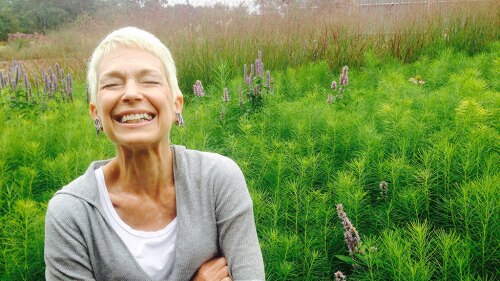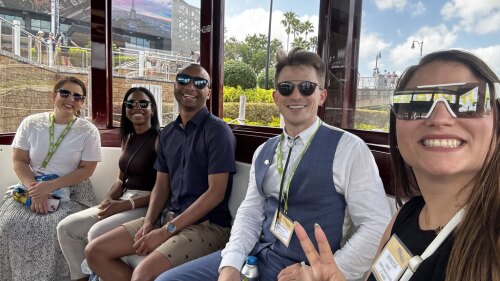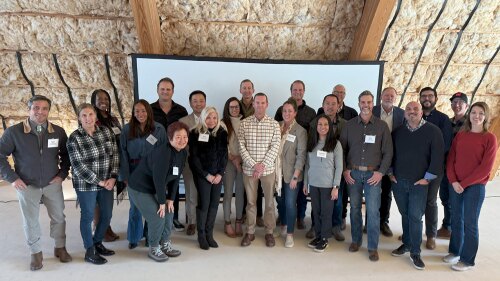When members donate to the ULI Foundation, their gifts support innovative efforts in the real estate industry
Whether they are increasing representation of women in the real estate industry, educating students and public officials about development, or helping local communities find solutions to their infrastructure needs, the programs that donors support by contributing to the ULI Foundation have a powerful impact.
Here are some recent highlights from some of the many programs supported by gifts to the Annual Fund and to the Foundation as a whole.
Helping women rise
In the decade-plus since its formal launch at the 2012 ULI Spring Meeting in Charlotte, the Women’s Leadership Initiative at ULI has worked to make women real estate professionals more visible within the Institute and to facilitate their growth as leaders. Thanks to the program’s efforts, a notable 30 percent surge in the representation of women leaders across district and product councils occurred over the past decade. Emma West, the current chair of the WLI Americas Executive Committee, can personally attest to the initiative’s positive influence upon her own career in the real estate industry, as well as her ascent through the ULI ranks.
West’s involvement with WLI began in 2014, when she was selected as part of the inaugural WLI Toronto Championship Team, an effort to raise the profiles of 100 local women who were high achievers in the real estate industry. “The co-chairs of the WLI committee created the team because they weren’t seeing women [acting] in leadership roles or being invited to do panel discussions,” explains West, who got to meet the rest of the honorees at a meeting and interact with them in subsequent sessions. “It was … this incredibly inspiring group of women. I think each of us would … leave those meetings, which were usually in the morning, and feel as [if] we could take on the world that day.”
West credits WLI with helping give her the confidence to change jobs and take on her current position as a partner at Bousfields Inc., a Toronto-based planning, design, and community engagement consulting firm. Her involvement in the group also led her to become more active in ULI, where she rose to become a District Council chair and participate in the WLI Americas committee that she now leads.
West says that the WLI has helped to significantly increase women’s participation in ULI, noting that female speakers now make up about 40 percent of the panelists at the Institute’s Fall and Spring Meetings. When WLI celebrated its 10th anniversary in 2022, the group began working on an updated strategic plan for how to expand its efforts. As a result, West says, WLI is developing a new program to help women real estate entrepreneurs with issues such as getting access to capital, and is working to better integrate with other parts of ULI, such as the Young Leaders Group.l
Gifts to the Foundation and the Annual Fund are powering these amazing initiatives and programs and are helping ULI reach its goal to raise $100 million to improve our communities through the Our Cities, Our Future campaign. That effort aims to further ULI’s mission priorities of accelerating decarbonization of the built environment, developing the next generation of diverse real estate leaders, and creating attainable housing strategies. Giving is also a way that each ULI member can make an impact across the organization that ripples into the world and generates positive change.
Product Council scholarships
Nearly a decade ago, Thomas J. McElroy was in his early 30s and relatively new to the real estate business when he joined the Urban Development Mixed Use Council (UDMUC) Red, one of ULI’s 68 U.S. Product Councils. McElroy recalls that he felt a bit intimidated at first to be part of discussions with prestigious senior figures in the real estate industry—“very, very heavy hitters,” as he describes them. He was thankful that one of the council members—Chicago-based CBRE executive Marty Stern—encouraged him to participate and share his views from a youthful perspective during Stern’s regular “hot topics” sessions.
“It was just an hour of Marty commanding the room and calling on people,” says McElroy, who is now senior vice president of capital markets for Dominium, a major nationwide developer and manager of affordable housing. “He just made it a special group, in which everybody felt close and connected.”
After Stern’s death in 2019, McElroy, who is UDMUC Red vice chair, joined other council members to honor him by creating a program to bring new people onto the council and increase its diversity. They started the Marty Stern Inclusion Fund, which provides $5,000 scholarships to pay for recipients’ ULI memberships for a year and enable them to travel to meetings.
“It’s a way to recruit rising talent, people who might otherwise not be able to afford to attend,” McElroy says. There’s an emphasis on creating an opportunity for younger people, particularly from minority groups, who can bring a different perspective to Product Council discussions.”
McElroy believes so strongly in the effort that he’s been working with ULI to get other Product Councils to participate in the program as well.
One prominent adopter is the Placemaking Council (PMC), whose chair, Candace Damon, says that it opted for a variation on the original formula. Instead of focusing on youth, PMC has provided scholarships to two established women professionals—one is the head of an institute at the University of Pennsylvania, and the other is a small-scale community-based developer.
“I’m sure you’re familiar with this debate about whether we really ought to be placemaking,” says Damon, who is board chair of HR&A Advisors, a strategic guidance, analysis, and implementation planning firm. “Why is the new place better than the old place? That’s a conversation that I really want to entertain. Damon thinks the two scholarship recipients will be “hugely helpful” in that discussion.
Addressing infrastructure needs
Since its inception in 2020, ULI’s Curtis Infrastructure Initiative, named in honor of the late ULI Foundation chair James J. Curtis III, has worked to help local communities find solutions for their infrastructure needs by funding research, as well as technical assistance provided by ULI’s District Councils.
Todd Mansfield, principal of the real estate investment and advisory firm Mansfield Company and a former ULI global chair, has served on the initiative’s advisory board. He explains that the initiative carries out Curtis’ vision. “His belief was that infrastructure was a driving force in shaping the built environment,” Mansfield says. “He wanted to make resources available in this … overlooked area, to identify best practices and find solutions. He defined infrastructure quite broadly. It’s not just roads and sidewalks, but also transit and public facilities. And it intersects with climate impacts. So, it’s a real top yield.”
One of the initiative’s big advantages is that the micro-grants it awards to District Councils for infrastructure projects ultimately have a multiplier effect, resulting in a larger impact. One example can be found in Rondo, a historic Black neighborhood in St. Paul, Minnesota, that suffered a decline in the late 1960s, after construction of an interstate highway cut a swath through it, resulting in the loss of 600 homes and 300 businesses.
In 2018, a ULI Advisory Services Panel studied an innovative possible solution for restoring Rondo’s vitality—putting a lid over the highway with a land bridge that would reconnect the neighborhood. The Curtis Infrastructure Initiative provided a $15,000 grant to build on the panel’s efforts.
Guided by ULI member expertise and in partnership with a District Council, ULI Minnesota, the project went on to receive an additional $6.2 million state grant in 2021. In March 2023, the federal government awarded an additional $2 million grant to enable further study of the concept, which could become a reality in a few years.
Educating communities about development
Through participation in a realistic training exercise, UrbanPlan enables high school and university students, community members, and public officials to better understand the forces that shape the built environment around them. Since starting during the first decade of the 21st century as an extracurricular activity at a few high schools in the San Francisco Bay Area, UrbanPlan has undergone tremendous growth. The educational program has spread across the United States and Canada, and taken hold in the United Kingdom, elsewhere in Europe, and in several Asian countries, as well. Just last year, the program reached 5,117 students and participants, shaping their perspectives and encouraging collaboration.
“One of the great things about UrbanPlan is that people get to experience the different roles in the development process,” explains Alissa Akins, vice president for UrbanPlan and ULI Learning. “It’s really easy for developers to say that the public sector [has] too many [rules and] regulations. And … it’s easy for the public sector to say, ‘Well, developers just want to make money.’ But the reality is that those decisions are a lot more nuanced.”
One of UrbanPlan’s strengths is that it helps participants to see that development is more than just erecting buildings, Akins says. “It’s more about community-building and helping people to think about the impact that a building has upon the people around it.”
In 2023, the program continued its efforts to get more local public officials to participate in the training exercise. “It’s an audience that we haven’t always reached effectively in the past,” Akins says. “UrbanPlan is a way of reaching and engaging them, and hopefully bringing them more into the ULI ecosystem.”
That outreach is exemplified by an UrbanPlan session that Akins helped to lead for city council members in a major U.S. city, during which they devised a development plan for an imaginary urban neighborhood with an array of realistic needs.
Public officials get a condensed, single-day version of UrbanPlan; students participate in a lengthier exercise, spread over part of a semester, in which they build their own financial model for the development project. Whereas the program strives to give public officials a more nuanced, multidimensional understanding of the development progress, “with the students, it’s more about collaboration, teamwork, and public speaking,” Akins says. “At the end of the day, the main goal is to enable the students to be more active in their communities.”
Gifts to the Foundation and the Annual Fund are powering these amazing initiatives and programs and are helping ULI reach its goal to raise $100 million to improve our communities through the Our Cities, Our Future campaign. That effort aims to further ULI’s mission priorities of accelerating decarbonization of the built environment, developing the next generation of diverse real estate leaders, and creating attainable housing strategies. Giving is also a way that each ULI member can make an impact across the organization that ripples into the world and generates positive change. UL
Patrick J. Kiger is a Washington, D.C.–based journalist.










